If a Dog Licks His Paws What Does That Mean
You are here: Home / Puppy Health & Care / Why Do Dogs Chew Their Paws, and How Can We Help Them To Stop?
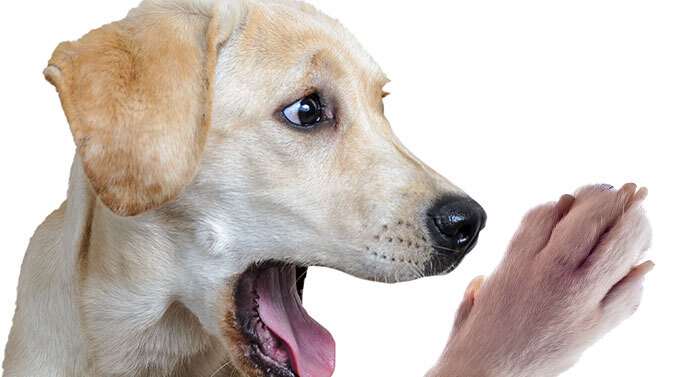
All dogs nibble on an itch now and then. But why do dogs chew their paws persistently? And why might they suddenly start chewing their paws when they didn't before?
The Happy Puppy team take a closer look at the reasons dogs chew their paws. We'll help you work out why your pup is biting their paws, and what to do about it.
All dogs lick their paws from time to time. And any dog might chew a little at a slight itch between the toes. But a dog chewing paws persistently may have a problem he needs your help with.
Paw chewing that starts suddenly could be due to pain, or irritation caused by parasites, dry skin, or allergies.
And licking or chewing paws regularly over a long period of time can be a sign of stress or boredom. It can lead to a cycle of skin damage and more licking, which can cause infection and serious wounds.
This guide will help you to work out why your dog is chewing their paws, and show you some simple ways to help. It will also help you decide when to involve your veterinarian, and show you how to avoid your dog chewing their paws again in the future.
Why Is My Dog Chewing His Paws
Here are the most common reasons for dogs to chew or bite their paws.
| Injury: | Check for cuts, foreign bodies, redness, swelling. |
| Other pain: | Limping with no obvious cause should be checked out by your veterinarian. |
| Parasites: | Check for ticks. Consider treating for fleas, and mites. |
| Allergies: | Is the chewing seasonal, or linked to walking in a particular place, or eating a specific food? |
| Dry Skin: | Check for dry or flaky skin. |
| Stress and Anxiety: | Has your dog recently had a big life change such as a house move, or new arrival at home? |
| Boredom: | Is your dog getting lots of mental stimulation, exercise, and human interaction? |
Let's take a look at each of those in more detail.

Injury
If your dog has suddenly started licking and chewing their paws, it may be the result of an injury.
Injuries that lead to dogs chewing paws include puncture wounds, cuts and scratches, and cracked or broken claws.
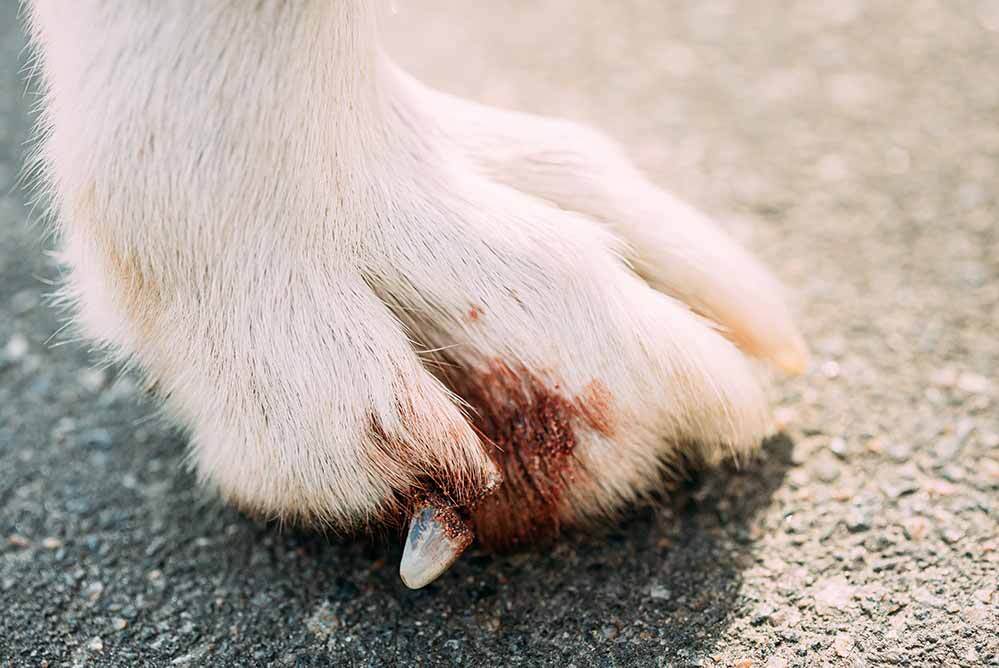
It's natural for dogs to lick an injury. Saliva has antiseptic properties, and in more primitive times this would have reduced the chance of a wound getting infected. So if your dog suddenly starts licking or chewing their paw, check carefully for any injuries to the paw or claws.
Nowadays of course we can provide better options than licking and chewing! You can read more about treating and preventing broken claws here.
And if you find a small injury on your dog's paw, follow these simple steps.
Treating A Small Paw Injury At Home
- Wash your hands
- Gently remove anything stuck in the paw
- Check nothing is embedded further in
- Give the paw a gentle wash with soap and water
- Consider wrapping the paw in a suitable sticky bandage if you think your pup is overlicking/chewing it
- Wash your hands again!
- Check the injury regularly for redness and swelling. Wash your hands before and after each check.
Ask your veterinarian for help if:
- Anything has embedded deeply in your dog's foot or under their skin
- There is a cut that 'gapes' when you gently press next to it
- A cut is bleeding heavily or 'spurting' or spraying blood*
- The wound bleeds for longer than ten minutes*
- Your dog seems generally unwell
- You see pus
- Your dog has a persistent limp or avoids putting the foot down when walking
- The foot is very red, is swollen, or is hot to touch
- Your dog is reluctant to let you help them
- You are unsure what best to do or have any concerns
*Heavy bleeding or bleeding that doesn't stop even when your dog lies quietly and lets you put gentle pressure on it for ten minutes, is an emergency. Call your veterinarian without delay!
Most minor scratches will heal naturally, especially if you help keep them clean.
If you do see the vet, and they prescribe antibiotics, make sure you give the full course of medicine, even if your dog seems to have recovered part way through.
Other Pain
Sudden chewing can also be due to something lodged between toes or pads of your dog's foot. Things like rocks, burrs, or even just overgrown hair between the toes, can be very irritating.
Make sure nothing is trapped in or between the toes. If you find anything, gently remove it.
Trimming any long fur between your dog's pads will minimize the chances of things sticking to it in future. You could also try having your dog wear booties when on asphalt, concrete, or other terrains that could damage their feet.
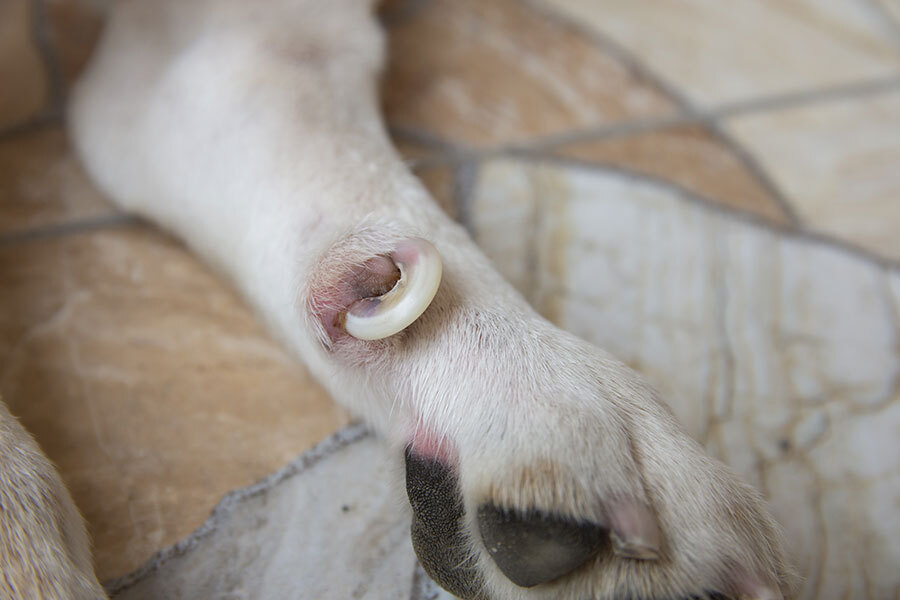
Check carefully for ingrown nails. If you find one, gently clip the nail above where it's ingrown, and lift the ingrown piece free.
Regular trimming of your dog's nails can help prevent fractured or ingrown nails in the future.
Serious Causes of Pain
In rare but serious cases, your dog may start chewing their feet, either gradually or suddenly, because of an autoimmune disease, like arthritis. Or even because of cysts, tumors, or other growths which may be cancer-related.
Biting and chewing due to cancer or autoimmune disease will require special treatment by your dog's vet. It could even require surgery.
Parasites
Parasites such as mites, fleas, lice or ticks can make your dog itch.
If you suspect a parasite infestation, you can treat mild cases at home with 'over the counter' medications.
Take a look at these articles for more help:
- Fleas On Puppies And Older Dogs
- What Do Ticks Look Like & How To Deal With Them
In cases of severe parasite infestation, however, don't do it yourself.
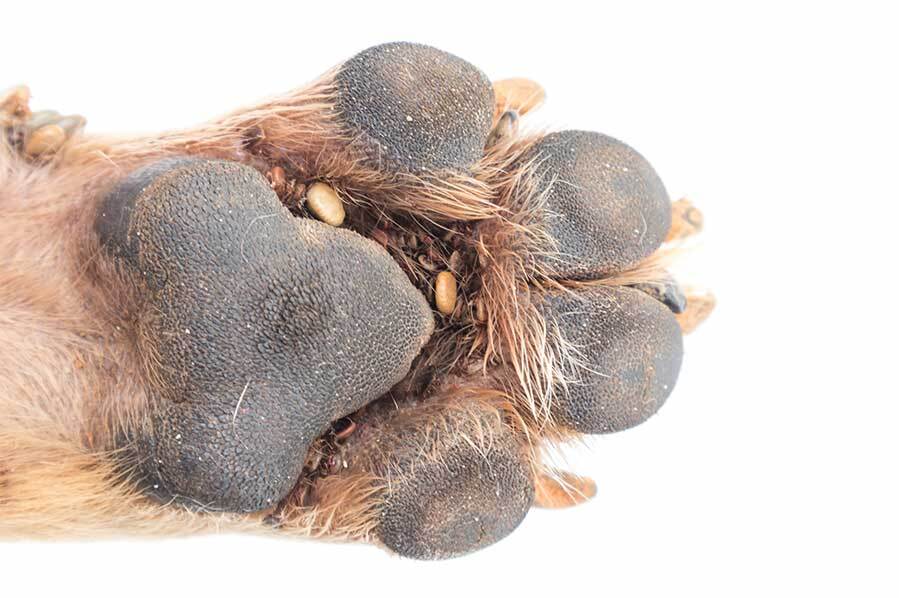
If your dog is very distressed, heavily infested, losing hair, or hasn't responded to mild at-home treatments, talk to your vet. They will be able to prescribe stronger treatments, or longer courses of treatment, safely.
Always keep your dog up to date on parasite preventatives to make sure they don't get parasites in the first place. This is important even if their paw chewing isn't related to parasites.
In addition to causing biting and chewing, many parasites carry dangerous diseases. These could make your dog sick or may even be life-threatening. In most cases, your dog's parasite preventative should protect your dog from fleas, ticks, and mites at an absolute minimum.
Allergies
The most common cause of ongoing, long term, chewing of paws is dermatitis, or skin inflammation, due to allergies.
Food allergies are particularly likely to cause dog chewing paws, but there are lots of other possible allergens.
'Allergens' are any substances that can cause allergies in susceptible dogs. They can include dust, dander, mold, pollen, fleas or flea treatments!
Plus, a variety of household goods such as rubber or plastic can be allergens. Even cleaning supplies and fabrics could trigger a dog allergy.
Treating Allergies That Cause Paw Chewing
If your dog is chewing due to an allergic reaction to a particular parasite, you'll need to treat the infestation, as discussed above. The itch may take a while to die down once the parasites have been treated.
For other allergies, the trick is to find the cause, and remove it from your dog's life as far as possible.
In the meantime, you can treat the symptoms.
If you suspect pollen is the problem, take a look at our advice on treating hay fever in dogs. Doggy hayfever causes skin itches, rather than the sore eyes and runny noose we humans suffer with!
Your vet may be able to prescribe medication to help ease your dog's allergies and break the paw chewing cycle. They will know what is safe for your dog to take, and at what dose. Be guided by them.
You may also find these articles on managing allergies helpful:
- Best Dog Food For Skin Allergies And Sensitive Skin
- Dog Food Allergies And How To Deal With Them
- Best Food for Golden Retrievers with Allergies
- Apoquel For Dogs With Allergies
- Temaril-P For Dogs
- Benadryl For Dogs
Dry Skin
Dry skin is also a common cause of dogs biting and licking their paws. Dogs may bite or lick to relieve the itchy feeling and any uncomfortable flaking.
Dry skin is usually caused by one of the other problems we have covered in this article, such as parasites or allergies. Finding and treating the cause will cure the dry skin.
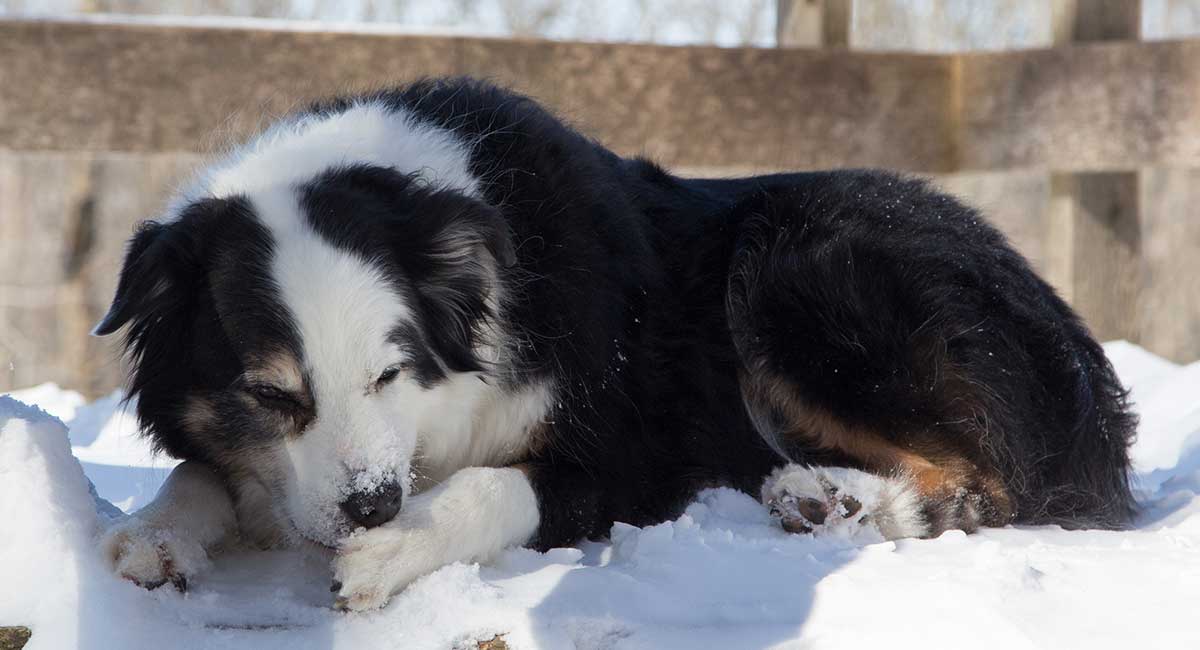
However dry skin can also be a sign of more serious problems. So if allergy treatments and de-fleaing don't improve your dog's skin, they should be given a thorough check up by their veterinarian.
You can help keep your dog's coat in tip top condition with regular grooming, and by making sure their diet includes plenty of healthy fats and oils.
Stress, Anxiety and Boredom
Paw biting and licking can also be a sign of mental distress in dogs. Dogs may use it as a method of self-soothing when they experience anxiety. Similar to nail biting in humans. They may also lick or chew to relieve boredom.
Factors that contribute to stress-induced paw chewing include:
- Being left alone for long periods of time
- moving house
- being crated for long periods of time
- a new dog (or cat) joining the family
- a death in the family or family member moving out
- loss of a companion dog
- any major change in lifestyle or environment
Unfortunately, stress chewing can cause dermatitis (broken itchy skin) where the chewing and licking took place. This sets up a cycle of chewing, skin damage, itching and more chewing that can be very hard to break. It can cause serious wounds and infections. This damage is referred to as Acral Lick Dermatitis and it is hard to cure.
Signs of Secret Chewing
Just because you don't see your dog chewing or biting their paws doesn't mean they're not doing it.
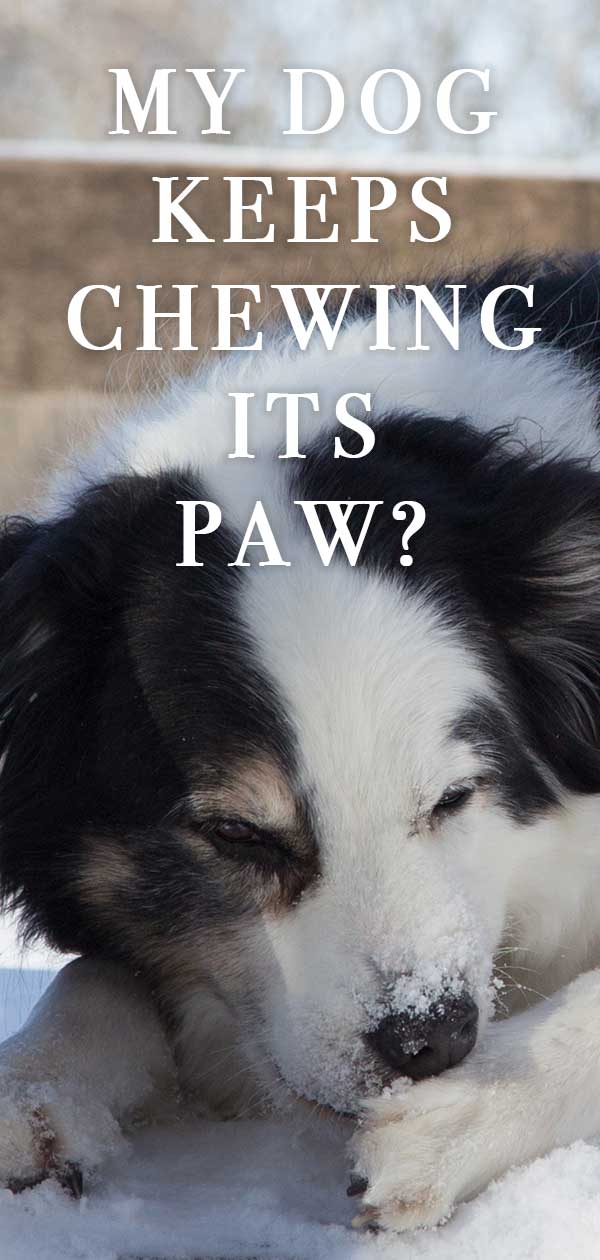
A dog chewing paws out of boredom or anxiety may only do so when you're not around. And dogs who have been scolded for chewing their paws may choose to leave the room to chew!
It's important, therefore, to keep an eye out for signs that your dog is chewing their paws. This is especially so if your dog is prone to anxiety or boredom or has a history of paw chewing. Look out for the following:

- Swollen paws
- Paws with red-tinged fur (the stain is caused by the red pigment, porphyrin, in dog tears and saliva.
- Unusually smelly paws
- Other signs of skin inflammation.
- Unusually warm dog paws
- Open wounds
- Patches of hair missing, especially on the paws
- Limping
If your dog shows any of these symptoms, you should take them to the vet as soon as possible.
Treating and Preventing Acral Lick Dermatitis
Your veterinarian may use strategies like bandaging the area, and putting steroid cream on to reduce the itch. However, these only tend to work if the reason for the chewing has been resolved.
Drugs to reduce anxiety may help break the chewing cycle, but again are only a temporary solution. Lifestyle changes are likely to be more help in the long run.
Make sure you're playing with your dog regularly. Give them plenty of affection. Reduce their time alone or confined and keep them busy with structured training and play.
Arrange doggy daycare, a dog walker, or pet sitter if your dog is anxious or bored when left alone. And ensure your dog has plenty of healthy and safe options to chew on — like toys and bones.
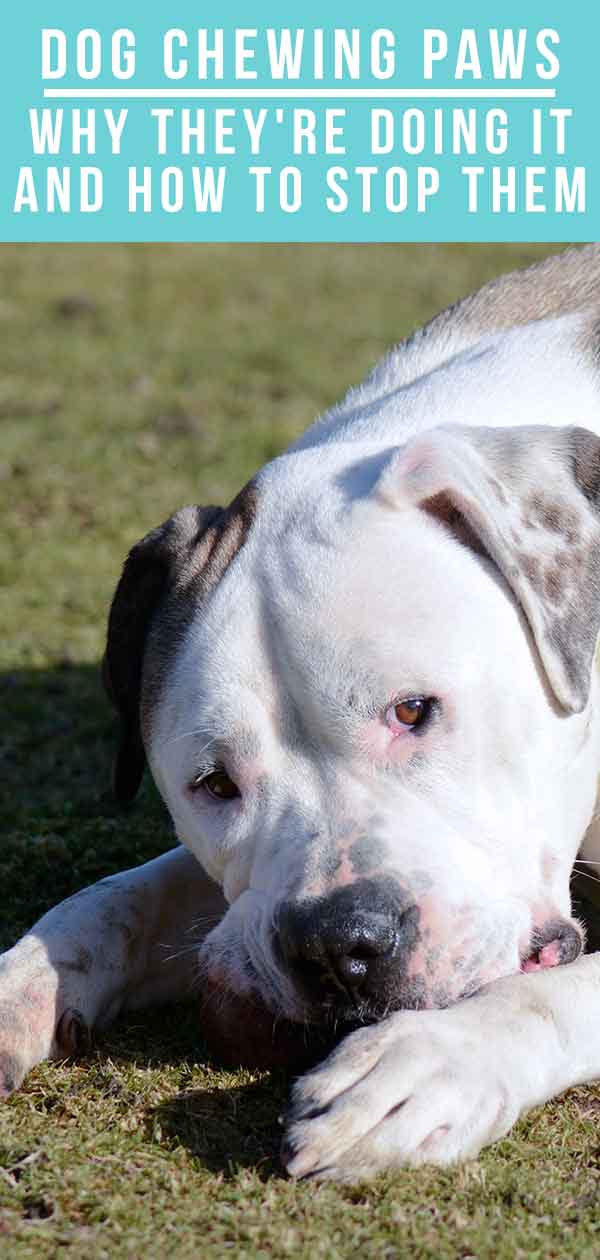
If the licking persists, your veterinarian may recommend an assessment from a behavioral therapist.
Dogs and Paw Chewing
Almost all dogs will bite or lick their paws occasionally. Sometimes dogs, just like humans, itch for no apparent reason.
But if your dog suddenly starts persistently chewing or licking their paws, you'll need to check for causes like injury, pain, parasites or allergies. And try to treat or remove the cause of the itching.
Long term problems with paw chewing can develop due to stress or boredom. They can be very difficult to treat, and lead to serious wounds and infections. So it's important to break the chewing cycle as early as possible, and ask your veterinarian for expert help.
If you can't find the cause of your dog's paw chewing here, do speak to your veterinarian. There are lots of other rarer causes, and they can help you to narrow it down.
The good news is, most paw chewing is short lived, or solvable. And help is available if you are worried.
If you've had a paw chewing dog in the past, why not tell us about it in the comments below. We'd love to hear more about your experience.
References and Further Reading
- SouthWest Journal. Hershey, T. VMD. New Options for Managing Pet Allergies
- Swaim S and Angarano D. 1990. Chronic problem wounds of dog limbs. Clinics in Dermatology.
- Freiman H and Grubelich L. 1994. Diseases of the foot and nails: Humans, cats, and dogs. Clinics in Dermatology.
- Hensel P et al. 2015. Canine atopic dermatitis: detailed guidelines for diagnosis and allergen identification. BMC Veterinary Research.
- Lund J and Jørgensen M. 1990. Behavior patterns and time course of activity in dogs with separation problems. Applied Animal Behavior Science.
- Hubrecht R.1993. A comparison of social and environmental enrichment methods for laboratory housed dogs. Applied Animal Behavior Science.
- Campbell B. 2006. Dressings, Bandages, and Splints for Wound Management in Dogs and Cats. Veterinary Clinics: Small Animal Practice.
- Bruet V et al. 2012.Characterization of pruritus in canine atopic dermatitis, flea bite hypersensitivity and flea infestation and its role in diagnosis. Veterinary Dermatology.
- Olivry T et al. 2015. Treatment of canine atopic dermatitis: 2015 updated guidelines from the International Committee on Allergic Diseases of Animals (ICADA). BMC Veterinary Research.
- Logas D and Kunkle GA. 1994. Double‐blinded Crossover Study with Marine Oil Supplementation Containing High‐dose Icosapentaenoic Acid for the Treatment of Canine Pruritic Skin Disease*. Veterinary Dermatology.
- Cannas S et al. 2014.Video analysis of dogs suffering from anxiety when left home alone and treated with clomipramine. Journal of Veterinary Behavior: Clinical Applications and Research.

If a Dog Licks His Paws What Does That Mean
Source: https://thehappypuppysite.com/dog-chewing-paws/
0 Response to "If a Dog Licks His Paws What Does That Mean"
Post a Comment